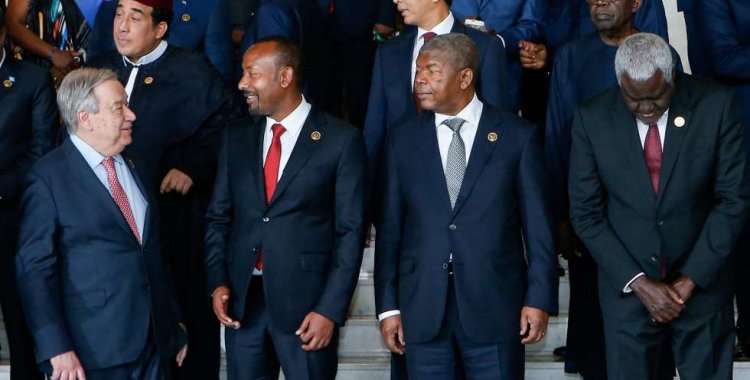"The divisive effect that the conflict in the Democratic Republic of Congo (DRCongo) is having on the African Union (AU) is evident, and is set to worsen with the march of the March 23 Movement rebels south of Goma," analysts wrote in a commentary on the weekend summit, at which Angola assumed the rotating presidency of the institution.
"As usual, the summit contrasted talk of unity and cooperative progress with less inspiring displays of enmity and petty rivalry," the analysts added, noting that the main events were "the election of the new African Union Commission and inconclusive discussions on the war in the DR Congo."
For analysts, the election of Mahamoud Ali Youssouf owes much to his victory in the three-way debate with Kenyan Raila Odinga and Malagasy Richard Randriamandrato, "where he expressed in three languages - English, French and Arabic - a solid understanding of the issues relevant to African diplomacy", but also taking advantage of the differences between the countries regarding the ongoing war in the neighboring country of Angola.
“Kenya’s president, who has worked closely with Odinga, is at odds with most African leaders, being a staunch supporter of Israel and close to Rwandan President Paul Kagame,” Oxford Economics writes, adding that “unease with the confidence displayed by the Kenyan delegation may also have influenced some votes in favor of Mahamoud Ali Youssouf, who was elected chair of the African Union Commission.”
Commenting on the summit's other two big developments - the creation of an African ratings agency and a new push for visa-free travel, analysts at the British consultancy write that while "many in Africa have long felt that the three main ratings agencies are too pessimistic about the creditworthiness of African countries, it is doubtful that creditors will put much faith in ratings that suddenly show countries as stronger than before."
On the other hand, they conclude, the strategic dialogue to accelerate visa-free travel in Africa "is at least a decidedly good idea".
After taking North Kivu's capital Goma in a lightning offensive in late January, the M23 armed group also took control of Bukavu on Sunday. Around 4,000 Rwandan soldiers are present in eastern DR Congo and the latest fighting has already caused almost 3,000 deaths, according to the UN.
The African Union, which has been criticized for its timid stance, called on Sunday for the "immediate withdrawal of the M23 and its supporters", warning of the "balkanization of DR Congo" and the break-up of the country, with vast swathes of territory now outside Kinshasa's control. However, he did not explicitly mention Rwanda.
Since the recent escalation of violence, the international community has repeatedly called for a de-escalation, a ceasefire, and a withdrawal of Rwandan troops, so far in vain, amid serious concerns that the conflict could degenerate into a regional war.
Neighboring countries Uganda and Burundi, as well as South Africa, have sent troops to the region to support the Congolese army. In a statement issued on Saturday, M23 demanded "the immediate withdrawal" of Burundian soldiers present in South Kivu.







